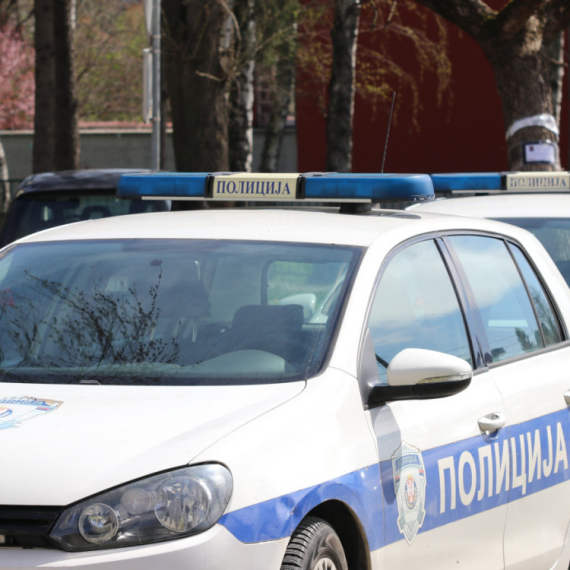Company clears industrial waste from two locations
The first load of the historical industrial waste from Serbia will soon be unloaded from the first overseas ship with that has recently reached China.
Thursday, 27.09.2012.
17:09

BELGRADE The first load of the historical industrial waste from Serbia will soon be unloaded from the first overseas ship with that has recently reached China. Serbian Export Company Elixir Group has been paid for the waste delivery. Company clears industrial waste from two locations Elixir Group had started the preparations for the removal of the pyrites cinders dumps stored on the gravel pit in Orasac. When asked what kind of landfill this was and how dangerous it was, Elixir Group President Stanko Popovic said: “In the course of several decades of its work, mainly in the period between the sixties and the nineties of the last century, former Plant Zorka Fertilizers had produced pyrite cinders as industrial waste, by using technology based on the production of sulfuric acid from pyrite. In order to maintain the continuity of its production of fertilizers, Zorka was forced to solve the problem of storing large quantities of this industrial waste that kept growing in years. For this purpose, Zorka had purchased the land belonging to the gravel pit on Orasac, in order to store pyrite cinders into the holes that emerged from gravel extraction,” he explained. “Thus, one problem has been solved, while the other kept growing, as in that period of time, future needs for environment protection of the underground waters, as well as surrounding agricultural soil and settlements were not taken into account, so they failed to make waterproof bed, as well as covering coatings that would permanently repair this landfill. These and similar landfills are defined on the ecological map of Europe as black holes, of top priority for being repaired. Zorka was in the process of liquidation, while the state hadn’t got funds available for this cause, so this issue remained unresolved for years,” Popovic added. When Elixir Group had bought off Zorka Fertilizers, it became the owner of the historical waste dump. It spreads on the total area of around 12 hectares, in the thick layer amounting to 13 meters. Almost a million tons of pyrite cinders is stored on this location, consisting of iron ore amounting to some 58 percent, sulfur, zinc, lead, silicon, and, to a lesser extent, some heavy metals, which places it under category of dangerous waste that has negative effect on the environment. Asked what Elixir Group would do with such a large quantity of dangerous waste, he pointed out that it was not possible to process this kind of industrial waste in Serbia. “In our country, there’s no possibility of processing this kind of industrial waste. We have found the possibility of processing it in China, and we have signed a contract to sell to the Chinese state company entire quantity of pyrite cinders that they process in their steel mills as an alternative iron ore. Thanks to the global industrial trends and the expansion of consumption of alternative raw materials in the Chinese metallurgical industry, we were presented with the opportunity to permanently dispose of this waste,” Popovic explained. “Transportation to China is very expensive, but we had in our favor the fact that the price of iron on the world market had risen to the level that this job proved profitable. This is an enormous job that already started with the repair of the even bigger dump in Prahovo. One overseas ship has already reached China, loaded with 180,000 tons of ore from Prahovo, and it is being presently unloaded. We expect to deliver to China two million tons of ore from Prahovo till the end of June 2013, so this large dump will be completely empty,” the Elixir Group president stressed. “At the same time, we will begin with removing pyrite cinders from Sabac. First, it is necessary that this material should be totally free of the gross municipal waste that is being dumped on this location along with the pyrite cinders. Parallel with this processing, we will set up assembly line and equipment for the safe transportation of the material from the dump to the ships. Moreover, we will adjust the coast accordingly on that location, so that the transportation ships could safely dock. We expect that emptying of this dump and transportation of the waste taken from it will take 12 months, at the most. Afterwards, this dump will be completely empty, and it would no longer present danger for human environment, underground waters, etc. After that, we will completely revitalize this area, by planting trees, and out of the dump filled with dangerous waste, we will create an area which is ecologically completely clean and safe,” he added. When asked why the company had chosen international freight transportation, Popovic that this was the safest possible way to transport the waste. “If we decided to transport the waste in trucks, this would represent an additional danger for pollution of roads in such a long period of time. Sabac would again turn red from the pyrite cinders. In this way, the removal of the dump contents would be executed only through an assembly line some hundred meters long, which is fully protected from spreading dust to the surrounding area and the river. We have taken care that this process be implemented in the most efficient way, so that we could protect environment and completely eliminate the possibility of a possible incident, without having a negative impact on the traffic jam. This is such a large quantity of waste material, figuratively speaking, this is about thousands of loaded ships heading from Sabac to Constance, where the pyrite cinders is being reloaded to the overseas ships,” he said. Popovic also explained how the dangerous waste had become a trading commodity. “In all the strategies pertaining to waste management, both worldwide and in Serbia, the sustainability in waste management is being promoted, along with recycling as a model of solving the problem of pollution. Besides, there is also EU Directive on waste management that determines the fact when the waste stops to be treated as such and when it can be defined as – end of waste. This means that through number of evaluations and procedures, it is possible to determine whether certain kind of waste can be used as technogenic resources, while there should be also facilities available that could use certain kind of waste material as raw material.” “The buyer in China had been identified that deals with the production of iron out of pyrite cinders, and in the process, entire waste has been destroyed, by which the EU Directive’s definition of the end of waste has been met. In this case, due to the large percentage of the iron ore amounting to 58 %, it is being determined that all the conditions had been fulfilled for the pyrite cinder to be treated as the commodity eligible for international trade. With signing the contract between Elixir Group and Chinese steel mills for the entire quantity of pyrite cinders from Prahovo and Sabac, through redefining the nature of this waste, an opportunity opened up for Serbia to become a big exporter to China, thus permanently cleaning our country from the pyrite cinders in the same time,” the Elixir Group president added. “Five years ago, the price of iron ore on the world market was on the level of some USD 50 per ton, and under those conditions, such a big and expensive project would be totally unprofitable. However, in the previous period of time, the market price had experienced significant increase, to the level that it proved to be quite rewarding along with the transportation costs to China and all other related costs for the acquisition of equipment and preparation of disposal area (Elixir Group had invested approximately EUR 2.5mn in this operation). Presently, the cost dropped again, but it is still a profitable job,” he noted. “How much is this job important for Serbia is apparent from the fact that China is ranked fourth when it comes to the import activities to Serbia, while as for export activities from Serbia, China is on the 66th position, according to the data of the Serbian Chamber of Commerce,” Popovic said. “To what extent this would improve our trading deficit with China, it is apparent from the fact that in this year, for the first six months, according to the same source of data, goods around USD 2.3mn worth had been exported to China, while we imported from this country the goods around USD 740mn worth. Only with executing this operation, will Elixir Group increase its export for at least ten times. This is still a small progress, but it significantly improves the overall position of Serbia,” stressed the Elixir Group head. When asked whether there was a possibility to recycle and process such waste material in the country, he said that there was not. “Steel Factory from Smederevo Sartid once used pyrite cinders as alternative iron ore, but it is not the case for a long time now, due to the lower quality of iron in this material, which in turn contributes to the bigger processing costs. Elixir Group examines new technologies from this field, primarily plasma technology that is implemented in Norway. If it proves to be rational and profitable to process pyrite cinders in such a way, we will consider the possibility of investing in this technology. In this case, we would completely disrupt the cycle of making such waste, to the full separation of all its components. By implementing such a technology, we would use all other mineral components of the cinder, not only iron ore,” he explained. Elixir Zorka Fertilizers revitalizes and constructs the facilities on the area where old Zorka Plant used to operate, preparing the renewal of the fertilizers production. When asked whether the new plant would also produce waste and whether there was a reason for the citizens of Sabac to be concerned as they remember well the air, water and land pollution they were exposed to in the past, he said that there was no reason for concern. “Elixir Group constructs facilities and acquires equipment under the highest European standards, devoted to protecting environment. Not only that we want to be a successful Serbian company, but we also want to create an image of a competitive company in European frameworks, as we want to export our fertilizer. We foster big responsibility towards our community, so this plant will not only be safe for the environment, but also the forerunner of ecological initiatives both in Sabac and in Serbia. The removal of pyrites cinders dump speaks for itself, as well as the way in which we renewed our factory, by cleaning the whole area where former Zorka was situated, including the surrounding area. We will endeavor to make a green factory when it comes to respecting ecological standards, and when it comes to working environment that will be covered with greenery,” he said. “It is planned that the factory launches its operations at the start of 2013. It already employs around 100 staff members that actively participate in its construction. All the employees are from Sabac, and most of them used to work in the old plant, and among them are several highly experienced and high-quality engineers that are very well familiar with the industry. In the next period, when the factory reaches its full potentials, additional employment opportunities will arise, and we are confident that Sabac, as an industrial city, can offer all needed working profiles - mechanical, technological, chemical in nature,” Popovic underscored. Elixir Group is also known as socially responsible company that helps the local community in various ways. It has reconstructed the Master building in Prahovo port, constructed sewerage system, along with water purifier, supported local football club, along with the Musical Festival Mokranjac Days, built a house for a poor family with four children. “We are convinced that we should not define our social responsibility only through our production, employment opportunities, regular salaries and tax payments, but also through direct investments in humanitarian and socially responsible field, as our country is getting more impoverished, leaving the weakest completely unprotected,” Popovic said. “Therefore, we have supported numerous campaigns, and the most recent one is being realized through B92 Fund, pertaining to the acquisition of the deficient ultrasound device for the maternity ward,” he added. “Moreover, we provide funds on our own for the acquisition of the modern device for the efficient surgery of the thyroid gland, the tonsils, etc, around EUR 30,000 worth, for the needs of the general hospital in Sabac. My mother, Ruza Popovic, is very devoted to humanitarian work through the Fund Generous Heart of Sabac and she is supported, both morally and financially, on the part of the whole family, Elixir Group and all staff members. We will in future closely follow the needs of the local community, joining in humanitarian campaigns, while we will on our own lead other campaigns, as was the case so far. We will continue to assist our community, leaving aside needed funds from our revenues for humanitarian causes on annual basis,” the Elixir Group president concluded. B92
Company clears industrial waste from two locations
Elixir Group had started the preparations for the removal of the pyrites cinders dumps stored on the gravel pit in Orašac.When asked what kind of landfill this was and how dangerous it was, Elixir Group President Stanko Popović said:
“In the course of several decades of its work, mainly in the period between the sixties and the nineties of the last century, former Plant Zorka Fertilizers had produced pyrite cinders as industrial waste, by using technology based on the production of sulfuric acid from pyrite. In order to maintain the continuity of its production of fertilizers, Zorka was forced to solve the problem of storing large quantities of this industrial waste that kept growing in years. For this purpose, Zorka had purchased the land belonging to the gravel pit on Orašac, in order to store pyrite cinders into the holes that emerged from gravel extraction,” he explained.
“Thus, one problem has been solved, while the other kept growing, as in that period of time, future needs for environment protection of the underground waters, as well as surrounding agricultural soil and settlements were not taken into account, so they failed to make waterproof bed, as well as covering coatings that would permanently repair this landfill. These and similar landfills are defined on the ecological map of Europe as black holes, of top priority for being repaired. Zorka was in the process of liquidation, while the state hadn’t got funds available for this cause, so this issue remained unresolved for years,” Popović added.
When Elixir Group had bought off Zorka Fertilizers, it became the owner of the historical waste dump. It spreads on the total area of around 12 hectares, in the thick layer amounting to 13 meters. Almost a million tons of pyrite cinders is stored on this location, consisting of iron ore amounting to some 58 percent, sulfur, zinc, lead, silicon, and, to a lesser extent, some heavy metals, which places it under category of dangerous waste that has negative effect on the environment.
Asked what Elixir Group would do with such a large quantity of dangerous waste, he pointed out that it was not possible to process this kind of industrial waste in Serbia.
“In our country, there’s no possibility of processing this kind of industrial waste. We have found the possibility of processing it in China, and we have signed a contract to sell to the Chinese state company entire quantity of pyrite cinders that they process in their steel mills as an alternative iron ore. Thanks to the global industrial trends and the expansion of consumption of alternative raw materials in the Chinese metallurgical industry, we were presented with the opportunity to permanently dispose of this waste,” Popović explained.
“Transportation to China is very expensive, but we had in our favor the fact that the price of iron on the world market had risen to the level that this job proved profitable. This is an enormous job that already started with the repair of the even bigger dump in Prahovo. One overseas ship has already reached China, loaded with 180,000 tons of ore from Prahovo, and it is being presently unloaded. We expect to deliver to China two million tons of ore from Prahovo till the end of June 2013, so this large dump will be completely empty,” the Elixir Group president stressed.
“At the same time, we will begin with removing pyrite cinders from Šabac. First, it is necessary that this material should be totally free of the gross municipal waste that is being dumped on this location along with the pyrite cinders. Parallel with this processing, we will set up assembly line and equipment for the safe transportation of the material from the dump to the ships. Moreover, we will adjust the coast accordingly on that location, so that the transportation ships could safely dock. We expect that emptying of this dump and transportation of the waste taken from it will take 12 months, at the most. Afterwards, this dump will be completely empty, and it would no longer present danger for human environment, underground waters, etc. After that, we will completely revitalize this area, by planting trees, and out of the dump filled with dangerous waste, we will create an area which is ecologically completely clean and safe,” he added.
When asked why the company had chosen international freight transportation, Popović that this was the safest possible way to transport the waste.
“If we decided to transport the waste in trucks, this would represent an additional danger for pollution of roads in such a long period of time. Šabac would again turn red from the pyrite cinders. In this way, the removal of the dump contents would be executed only through an assembly line some hundred meters long, which is fully protected from spreading dust to the surrounding area and the river. We have taken care that this process be implemented in the most efficient way, so that we could protect environment and completely eliminate the possibility of a possible incident, without having a negative impact on the traffic jam. This is such a large quantity of waste material, figuratively speaking, this is about thousands of loaded ships heading from Šabac to Constance, where the pyrite cinders is being reloaded to the overseas ships,” he said.
Popović also explained how the dangerous waste had become a trading commodity.
“In all the strategies pertaining to waste management, both worldwide and in Serbia, the sustainability in waste management is being promoted, along with recycling as a model of solving the problem of pollution. Besides, there is also EU Directive on waste management that determines the fact when the waste stops to be treated as such and when it can be defined as – end of waste. This means that through number of evaluations and procedures, it is possible to determine whether certain kind of waste can be used as technogenic resources, while there should be also facilities available that could use certain kind of waste material as raw material.”
“The buyer in China had been identified that deals with the production of iron out of pyrite cinders, and in the process, entire waste has been destroyed, by which the EU Directive’s definition of the end of waste has been met. In this case, due to the large percentage of the iron ore amounting to 58 %, it is being determined that all the conditions had been fulfilled for the pyrite cinder to be treated as the commodity eligible for international trade. With signing the contract between Elixir Group and Chinese steel mills for the entire quantity of pyrite cinders from Prahovo and Šabac, through redefining the nature of this waste, an opportunity opened up for Serbia to become a big exporter to China, thus permanently cleaning our country from the pyrite cinders in the same time,” the Elixir Group president added.
“Five years ago, the price of iron ore on the world market was on the level of some USD 50 per ton, and under those conditions, such a big and expensive project would be totally unprofitable. However, in the previous period of time, the market price had experienced significant increase, to the level that it proved to be quite rewarding along with the transportation costs to China and all other related costs for the acquisition of equipment and preparation of disposal area (Elixir Group had invested approximately EUR 2.5mn in this operation). Presently, the cost dropped again, but it is still a profitable job,” he noted.
“How much is this job important for Serbia is apparent from the fact that China is ranked fourth when it comes to the import activities to Serbia, while as for export activities from Serbia, China is on the 66th position, according to the data of the Serbian Chamber of Commerce,” Popović said.
“To what extent this would improve our trading deficit with China, it is apparent from the fact that in this year, for the first six months, according to the same source of data, goods around USD 2.3mn worth had been exported to China, while we imported from this country the goods around USD 740mn worth. Only with executing this operation, will Elixir Group increase its export for at least ten times. This is still a small progress, but it significantly improves the overall position of Serbia,” stressed the Elixir Group head.
When asked whether there was a possibility to recycle and process such waste material in the country, he said that there was not.
“Steel Factory from Smederevo Sartid once used pyrite cinders as alternative iron ore, but it is not the case for a long time now, due to the lower quality of iron in this material, which in turn contributes to the bigger processing costs. Elixir Group examines new technologies from this field, primarily plasma technology that is implemented in Norway. If it proves to be rational and profitable to process pyrite cinders in such a way, we will consider the possibility of investing in this technology. In this case, we would completely disrupt the cycle of making such waste, to the full separation of all its components. By implementing such a technology, we would use all other mineral components of the cinder, not only iron ore,” he explained.
Elixir Zorka Fertilizers revitalizes and constructs the facilities on the area where old Zorka Plant used to operate, preparing the renewal of the fertilizers production.
When asked whether the new plant would also produce waste and whether there was a reason for the citizens of Šabac to be concerned as they remember well the air, water and land pollution they were exposed to in the past, he said that there was no reason for concern.
“Elixir Group constructs facilities and acquires equipment under the highest European standards, devoted to protecting environment. Not only that we want to be a successful Serbian company, but we also want to create an image of a competitive company in European frameworks, as we want to export our fertilizer. We foster big responsibility towards our community, so this plant will not only be safe for the environment, but also the forerunner of ecological initiatives both in Šabac and in Serbia. The removal of pyrites cinders dump speaks for itself, as well as the way in which we renewed our factory, by cleaning the whole area where former Zorka was situated, including the surrounding area. We will endeavor to make a green factory when it comes to respecting ecological standards, and when it comes to working environment that will be covered with greenery,” he said.
“It is planned that the factory launches its operations at the start of 2013. It already employs around 100 staff members that actively participate in its construction. All the employees are from Šabac, and most of them used to work in the old plant, and among them are several highly experienced and high-quality engineers that are very well familiar with the industry. In the next period, when the factory reaches its full potentials, additional employment opportunities will arise, and we are confident that Šabac, as an industrial city, can offer all needed working profiles - mechanical, technological, chemical in nature,” Popović underscored.
Elixir Group is also known as socially responsible company that helps the local community in various ways. It has reconstructed the Master building in Prahovo port, constructed sewerage system, along with water purifier, supported local football club, along with the Musical Festival Mokranjac Days, built a house for a poor family with four children.
“We are convinced that we should not define our social responsibility only through our production, employment opportunities, regular salaries and tax payments, but also through direct investments in humanitarian and socially responsible field, as our country is getting more impoverished, leaving the weakest completely unprotected,” Popović said.
“Therefore, we have supported numerous campaigns, and the most recent one is being realized through B92 Fund, pertaining to the acquisition of the deficient ultrasound device for the maternity ward,” he added.
“Moreover, we provide funds on our own for the acquisition of the modern device for the efficient surgery of the thyroid gland, the tonsils, etc, around EUR 30,000 worth, for the needs of the general hospital in Šabac. My mother, Ruža Popović, is very devoted to humanitarian work through the Fund Generous Heart of Šabac and she is supported, both morally and financially, on the part of the whole family, Elixir Group and all staff members. We will in future closely follow the needs of the local community, joining in humanitarian campaigns, while we will on our own lead other campaigns, as was the case so far. We will continue to assist our community, leaving aside needed funds from our revenues for humanitarian causes on annual basis,” the Elixir Group president concluded.





























Komentari 1
Pogledaj komentare